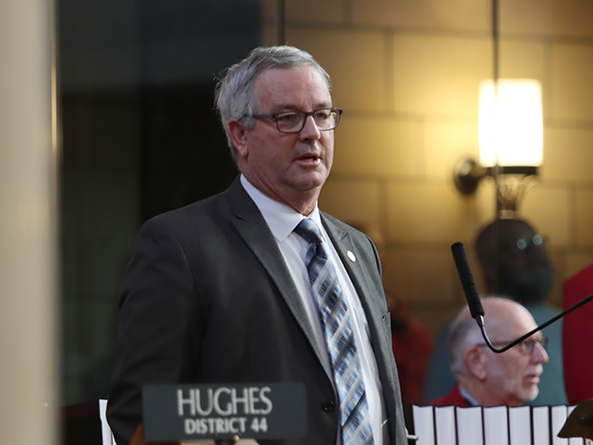Expanded riparian weed control program, other measures advanced
Lawmakers gave first-round approval March 3 to a bill that would expand a program intended to control noxious weeds and invasive plant species in Nebraska’s rivers after amending it to include two other proposals heard by the Agriculture Committee this session.
The grant program, administered by the state Department of Agriculture, provides funding to weed management entities, local weed control authorities and natural resources districts for vegetation management projects whose primary purpose is to improve streamflow in natural streams.
LB805, introduced by Sen. Dan Hughes of Venango, would state legislative intent to appropriate $3 million per year to the program beginning in fiscal year 2022-23, up from $1 million per year.
Currently, eligible projects must be related to vegetation management within a streambank or within 100 feet of the banks of a channel of any natural stream. Under Hughes’s proposal, management activities could extend to a natural stream’s floodplain.
Omaha Sen. Steve Lathrop opposed the bill, saying floodplains generally comprise land that is privately owned. Controlling vegetation on private property should be at the landowner’s expense, not taxpayers’, he said.
An Agriculture Committee amendment, adopted 32-1, includes the provisions of two other bills introduced by Hughes this session, LB712 and LB802.
The provisions of LB712 would make several changes to the Black-Tailed Prairie Dog Management Act, which authorizes county boards to control black-tailed prairie dogs on property within the county.
The act, passed by the Legislature in 2012, requires landowners to manage prairie dog colonies on their property to prevent the animals from expanding to adjacent property if a neighboring landowner objects to the expansion.
Under the amendment, an adjacent landowner could waive their objection to the expansion of a prairie dog colony onto their property. The proposal also would repeal provisions under which landowners who are responsible for an unmanaged prairie dog colony could be found guilty of an infraction and fined up to $1,500.
Currently, a county’s failure to publish general notice of a prairie dog management plan — or to serve a landowner with individual notice of a plan — does not exempt a landowner from the law’s requirements. The amendment would repeal that provision and clarify that counties must serve individual notices by certified mail.
The provisions of LB802 would update the Nebraska Wheat Resources Act, which authorizes a 0.4 percent excise tax on wheat sold through commercial channels in the state.
The amendment would repeal the requirement that growers pay the checkoff when wheat is pledged or mortgaged as security for a federal price support program loan. Under the provisions of LB802, the tax would be collected only by the first purchaser when the wheat is sold, and it would not be collected if wheat is sold as seed.
Hughes’s proposal would require first purchasers to maintain a record of all settlements in which they did not collect the excise tax and report the number of bushels of wheat for which they did collect it.
Finally, the amendment would authorize the Nebraska Wheat Development, Utilization and Marketing Board to acquire ownership rights to any wheat variety and to develop, produce, market or sell seed for any wheat variety it owns.
Hughes said the change would help the board better market varieties developed by the University of Nebraska’s wheat breeding program, which is funded in part by the checkoff.
Senators voted 33-5 to advance the bill to select file.


